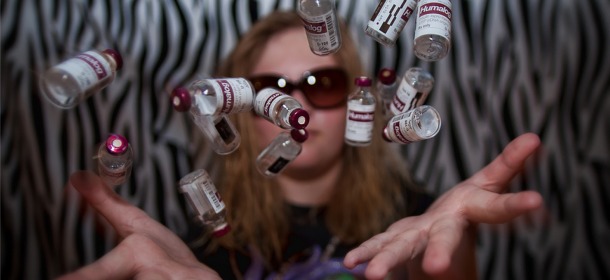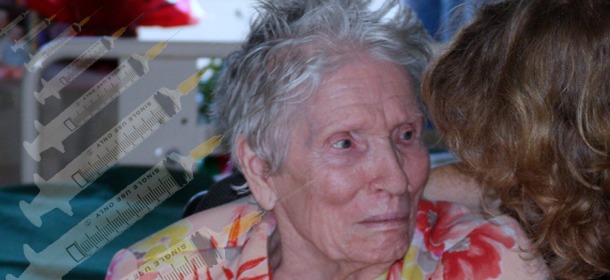Diseases/Conditions
Insulin Doubles Death Rate in Type 2 Diabetics: Study
A new study clearly documents that the standard treatment for type 2 diabetes is a killer, resulting in more than double the deaths. The treatment justification has always been based on irrelevant criteria—just as it is with most pharmaceutical treatments.

Enough with Insulin! by Jeff Fillmore
by Heidi Stevenson
It seems so intuitive: People with diabetes should inject insulin. In the case of people with type 1 diabetes, in which the pancreas doesn’t produce insulin, that’s probably true. However, modern doctors routinely give insulin to people with type 2 diabetes simply because it reduces blood sugar levels.
The reality, though, is that type 2 diabetics who take insulin injections die at more than double the rate of those given non-insulin treatment!
The Study
The study, Mortality and Other Important Diabetes-Related Outcomes With Insulin vs Other Antihyperglycemic Therapies in Type 2 Diabetes, investigated 84,622 primary care patients with type 2 diabetes from 2000 to 2010 and compared the results of these treatments:
- Metformin monotherapy
- Sulfonylurea monotherapy
- Insulin monotherapy
- Metformin plus Sulfonylurea combination therapy
- Insulin plus Metformin combination therapy
These groups were compared for risks of certain severe adverse events: cardiac, cancer, and mortality. A primary outcome was defined as any one of these events occurring, but each such event was counted only once and only if it was the first adverse result. Any one of these events happening at any time, plus microvascular complications, counted as a secondary outcome. The results were dramatic.
Those on Metformin therapy had the lowest death rates, so that group was used as the reference.
In terms of primary outcome—that is, consideration of first adverse events only:
- Sulfonylurea therapy resulted in patients being 1.4 times more likely to suffer one of these outcomes.
- A combination of Metformin and Insulin resulted in 1.3 times greater risk.
- Insulin therapy alone resulted in 1.8 times greater risk.
- Those considered to be at greater risk because of glycosylated hemoglobin had as much as 2.2 times greater risk with Insulin therapy alone.
When considering any of these events happening, whether they were the first event or a subsequent one, the results were even more dramatic:
- Insulin monotherapy resulted in:
- 2.0 times more myocardial infarctions.
- 1.7 time more major adverse cardiac events
- 1.4 time more strokes
- 3.5 times more renal complications
- 2.1 time more neuropathy
- 1.2 times more eye complications
- 1.4 times more cancer
- 2.2 times more deaths
Medical Hubris
Modern medicine’s hubris allows it to make claims that simply are not supported. Based on those unsupported claims, thousands—and in the case of diabetes, millions—of people are placed on drugs and regimens that have never been demonstrated to have any beneficial effect. The result is that the general public becomes a mass of guinea pigs for medical experimentation—experimentation that isn’t even documented and analyzed!
The use of insulin in type 2 diabetics is only one example, but it’s been clearly demonstrated again and again with disasters like Vioxx.
Redirection to Markers
The method by which these treatments are justified is a little redirection away from what really counts. What matters is whether lives are improved and lengthened. But drugs are rarely tested on that basis. The excuse generally given is that it would take too long. But if that were a valid explanation, then surely we’d see the regulating agencies keeping careful and formal oversight over the experiences of all new drugs for the first few years of use. That, though, simply doesn’t happen.
Instead of looking at the outcomes that matter, substitutes are used. They’re called markers, which are intermediate results that are assumed to be indicative of benefit. In the case of insulin, the marker is blood sugar level. Insulin is required to transport glucose (blood sugar) into cells so that they can produce energy. Thus, insulin reduces blood sugar levels. If artificial pharmaceutical insulin brings blood sugar to more “normal” levels, then the treatment is considered successful.
Invalid Markers
As this study has demonstrated, markers are simply not a valid way to determine effectiveness of a treatment. In type 2 diabetes, the problem isn’t a lack of ability to produce insulin; neither is it high blood glucose. The problem is the cells’ ability to utilize insulin to transport glucose from blood into cells.
The problem is that cells’ ability to use insulin has deteriorated. So, how can it be beneficial to give more insulin when cells are unable to utilize what’s already there? Clearly, that’s counterproductive.
Yet, that’s precisely what doctors do! They give insulin to replace insulin, when a lack of insulin isn’t the problem! It should come as no surprise that the real concerns of anyone being treated for diabetes are not answered by insulin treatment.
As this study has demonstrated, forcing insulin into the body actually results in worse outcomes. How many decades has this treatment been in vogue? All that time it’s been justified because it reduces blood sugar. But the effects that count—quality of life and longevity—haven’t been considered.
There’s one lesson to be learned here: Health isn’t found in pharmaceutical drugs, not even old tried-and-true drugs.
Sources:
- Mortality and Other Important Diabetes-Related Outcomes With Insulin vs Other Antihyperglycemic Therapies in Type 2 Diabetes, Journal of Clinical Endocrinology & Metabolism, Craig J. Currie, Chris D. Poole, Marc Evans, John R. Peters and Christopher Ll. Morgan; doi:10.1210/jc.2012-3042
Tagged big pharma, conventional medicine, diabetes combination treatment, insulin double death rate, insulin treatment type 2 diabetes, metformin diabetes, modern medicine, Sulfonylurea diabetes, type 2 diabetes insulin, type 2 diabetes insulin cancer, type 2 diabetes insulin eye complications, type 2 diabetes insulin heart disease, type 2 diabetes insulin neuropathy, type 2 diabetes insulin renal complications, type 2 diabetes insulin stroke, type 2 diabetes insulin treatment death














Pingback: Iνσουλίνη, άλλος ενας μύθος καταρρίπτεται; | fytro
Pingback: Ἰνσουλίνη, ἄλλος ἕνας μύθος καταρρίπτεται; | Φιλονόη καὶ Φίλοι…